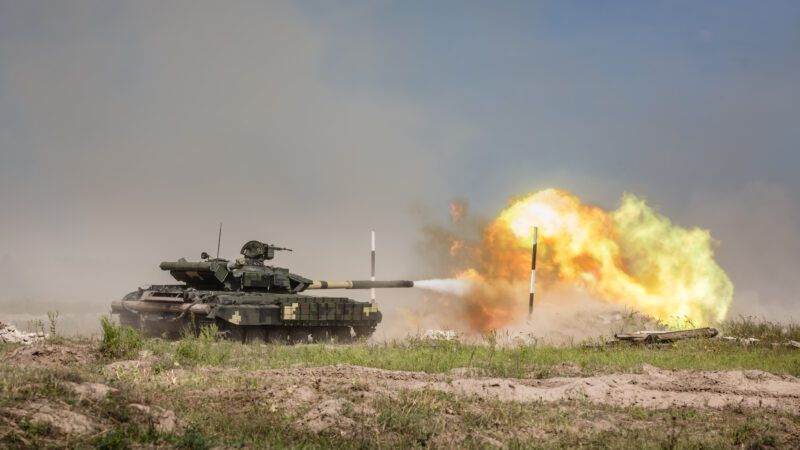Ukraine's Sluggish Counteroffensive Raises Questions About U.S. Support
Should the U.S. continue to bankroll the counteroffensive?

President Joe Biden has claimed that the U.S.'s support for Ukraine "will not waver" amid its conflict with Russia, but new reports about the slow pace of Kyiv's counteroffensive highlight the costs of the fighting.
The New York Times reported last week that newly Western-trained Ukrainian brigades have failed to achieve any "sweeping gains," due to Russian artillery fire. Similarly, CNN has highlighted Ukraine's difficulty in penetrating Russian defenses, with one Ukrainian official calling the density of Russian mines "insane." And Politico reported Tuesday that U.S. officials expect the counteroffensive to last "at least through the fall and possibly into the winter."
These reports follow a July 25 story in The Wall Street Journal claiming that the failure of Ukraine's counteroffensive to achieve its objectives has many Western officials fearing an "open-ended conflict"—and pessimistic that conflict-ending negotiations will occur this year.
"We are not expecting that they will be able to recover all the territory that was lost to Russia, especially if you are considering Crimea and even the territory which was lost in 2014 with Donbas," one European official told the Journal.
"It's going on pretty much according to the way I thought it would," says Lyle Goldstein, a visiting professor at the Watson Institute for International and Public Affairs at Brown University. "It always seemed ridiculous that you could have armored elements advancing without air cover, never mind having a deficiency in artillery. And when you add the mines to it, it always struck me as a nearly impossible task."
Yet earlier Western expectations thought Ukrainian valor could overcome this reality. As the Journal reported earlier in July, "Western military officials knew Kyiv didn't have all the training or weapons—from shells to warplanes—that it needed to dislodge Russian forces. But they hoped Ukrainian courage and resourcefulness would carry the day."
"Pentagon and White House officials had low confidence of Ukrainian success, but allowed them (actually, outright facilitated their ability) to go on an offensive that was almost certain to fail," says Daniel L. Davis, a senior fellow at Defense Priorities. Ukrainian soldiers, he adds, "shouldn't have been sacrificed for a mission that was all but militarily unattainable."
For Ukraine's counteroffensive to succeed, the country's armed forces need time to wear down Russian defenses. "At this stage of active hostilities, Ukraine's Defense Forces are fulfilling the number one task—the maximum destruction of manpower, equipment, fuel depots, military vehicles, command posts, artillery and air defense forces of the Russian army," wrote Oleksiy Danilov, secretary of the National Security and Defense Council of Ukraine, a month ago. "We are acting calmly, wisely, step by step."
But Ukraine's plans also require the U.S. and its allies to provide more military aid. "The only real response is an industrial mobilization that will give Ukrainians, and the Russians, a clear message that the Ukrainians will always have plenty of what they need," one Washington-based diplomat told The Wall Street Journal.
Such a policy underestimates the costs and dangers of supplying arms for the offensive, such as the threat of nuclear escalation. Former Russian President Dmitry Medvedev stoked these fears on July 30 when he said that Russia would be forced to use nuclear weapons if Ukraine's offensive were to infiltrate Russian territory.
"I've been regularly documenting all kinds of nuclear threats that have traded back and forth," says Goldstein, "and I personally think that we've kind of underplayed those for political reasons."
There is another way the U.S. can help end the war. Instead of continuing to aid the counteroffensive, Washington could facilitate a negotiated end to the conflict by opening back-door diplomatic channels.
"The most prudent course of action now is to stop the offensive, use the rest of their striking force to begin digging in so that they guard against a Russian counterattack this summer," says Davis. "And then seek a ceasefire to end the killing of their men and destruction of their cities, and try to find a negotiated way out."
"The Ukrainians achieved a miracle—they saved the Ukrainian state—so they should pocket that victory and try to come to some kind of ceasefire," adds Goldstein. "I don't really see major political changes coming in either Moscow or Kyiv, so maybe a Korea-like settlement is the best we can hope for."


Show Comments (281)